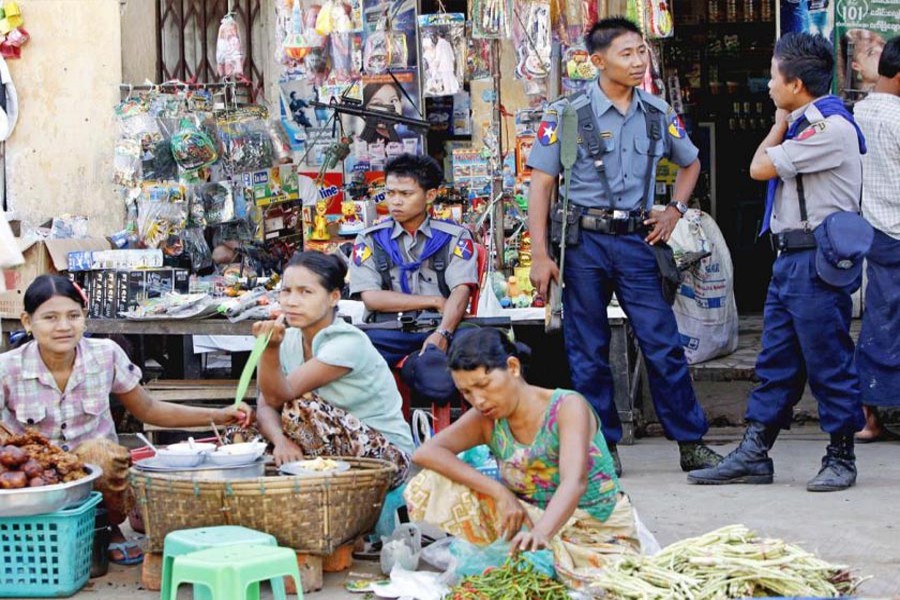Despite rich resources and good geographical location, Rakhine State has many challenges to overcome if it is to attract foreign investments, people in the business community say, according to a report by www.mmtimes.com.
“Foreign investments have slowed due to conflict in the state. The economy of Rakhine needs to be promoted first and only when it is conducive, will problems such as international pressure, inclusive development and conflict be reduced,” said U Tun Tun Naing, member of the Union of Myanmar Federation of Chambers of Commerce and Industries (UMFCCI).
“The turmoil in Rakhine can be partly attributed to low levels of education in the state, so education must be promoted. With no job opportunities, there is no income .If livelihoods could be improved, there would be less conflict,” he said.
“As a whole, Myanmar’s economy rests on the resolution of problems in Rakhine. If Rakhine is stable, and peaceful, then other countries will invest in other part of the country, so, we have to focus more on Rakhine,” he said.
Myanmar and Bangladesh are currently working on efforts to repatriate some of the hundreds of thousands of displaced people from Rakhine living in refugee camps around Cox’s Bazar in Bangladesh.
“The issue is what they will do when they return. If there are no jobs or security, problems will persist. After repatriation, many job opportunities must be created. Peace must be restored,” U Tun Tun Naing said.
Rakhine officials and the business community say that if economic conditions improve, conflicts can be prevented from occurring again, but investments will be needed if conditions are to improve.
“If the economy improves to some extent, no one will want to make troubles - it is human nature,” said U Aung Myint Thein, chair of the Maungdaw Border Trade Association.
While the state is host to large projects such as the Kyaukphyu Special Economic Zone and deepsea port, and the Kaladan Multi-Modal Transit Transport Project, have been no major investments in the conflict-ridden northern area of the state except for the Kanyin Chaung Economic Zone project along the Myanmar-Bangladesh border funded by the state government and local firms.
The Kanyin Chaung Economic Zone is being set up in the hopes of boosting economic growth and creating jobs said Rakhine State Minister of Planning and Finance U Kyaw Aye Thein.
He added that in the long run it is hoped the zone will contribute to economic-based stability in the state.
Thanks to the Kyaukphyu Deep Sea Port project, the area around Kyaukpyu will develop, but towns like Buthidaung, Maungdaw, Taungpyo and Minpyar in the northern part of Rakhine will be left behind. Investments will be needed if these areas are to develop, said U Tun Tun Naing.
“Free-trade zones and terminals should be opened at the Maungdaw border area. The area also has the potential for agricultural, livestock breeding, industrial, and SME zones. In other words, the area offers potential and is ripe for investment,” he said.
The Invest Myanmar Summit 2019 event set to take place next month is expected to focus on drawing investments to the state of Kachin, Chin, Mon, Rakhine, and Shan, and the regions of Taninthayi, Yangon and Mandalay. During the event, visitors will be able to meet with and speak directly to officials from state and regional government officials regarding potential investment opportunities,” U Tun Tun Naing said.
Invitations to the event were sent to potential investors from China, Hong Kong, South Korea, Japan, Thailand, Singapore, India, the UK and the US.
‘‘Rakhine State is safe. We want to see more investments in Rakhine because Rakhine will be peaceful only if it develops. It requires job opportunities to make Rakhine more developed. India and Rakhine are located either side of the Bay of Bengal, so, India could play a role in helping Rakhine’s economy,” said U Tun Tun Naing.
It will be more difficult for Rakhine to invite investments from western countries but easier from India. Rakhine and India have been trade partners since the colonial era and there are is still cross-border trading today that benefits both countries, he said.
‘‘It is good to increase investments in Rakhine. However, we need to consider whether it is beneficial to us. I don›t think investments will come as there are many challenges in Rakhine. I don›t think other investments will come to Rakhine other than from China. To build infrastructure in Rakhine, we have to generate income from other sources also,” said economist U Aung Ko Ko.
Among the over three million population of Rakhine State, over 60 per cent are of working age, according to the 2014 National Census data. Some work as fishermen while others work in agriculture. Although rice is a major crop, farmers are facing pressure from low prices. Fishermen, on the other hand, are encountering diminishing catches, causing unemployment among their ranks. There are few factories or large businesses to provide alternative employment
International pressure over humanitarian issues is a challenge for the state economy, said Rakhine State, Rathedaung Township, State Hluttaw MP U Oo Than Naing.


